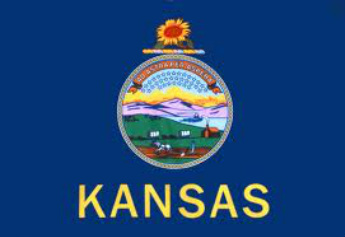Hello!
To honor Kansas Day, I decided to publish a few interesting things about the state.
• Kansas was the 34th state; on January 29th 1861 (Hence the day chosen for celebration.)
• Coincidentally, Kansas is also the 34th largest state in the U.S. by population.
• Their largest city is Wichita, and the capital is Topeka, and I have to say, those are two of the most fun to say words ever used.
• The highest point is Mt. Sunflower, at 4039 ft. above sea level; the lowest point is 680 ft. above sea level in the Verdigris river.
• Their state animal is the Buffalo, the state bird is the Western Meadowlark, and the state insect is the honeybee.
• Their nickname is the sunflower state, but I think something more apt would be "the grain state".
Here are a few images:
I decided to compile another list of tiny little holidays. As it turns out, if you want a specific day to become a national day or holiday, you have to go through this whole ordeal with congress and stuff. So lots of companies will actually just create their own little mini holidays, most of which are forgotten, of course. So here's the list:
October is Eat Country Ham Month October 18th: No Beard Day and Alaska Day October 22nd: National Nut Day October 24th: United Nations Day (This one is targeted at you crazy MUN people) November 3rd: Housewife's Day and Sandwich Day November 5th: Guy Fawkes Day November 8th: Dunce Day Someone should nominate Aphra as the mascot for this Holiday. Just kidding Aphra. November 16th: Have a Party with your Bear Day (I have no idea what this means.) November 17th: Homemade Bread Day Ok, for this one Andrew and Kevin are mascots. I'm not kidding this time. November 20th: Absurdity Day January 29th: Kansas Day
I go through periods of nostalgia occasionally. Like when I wrote archaic words on my arm in an attempt to memorize and utilize them in everyday conversation. Alas, the attempt was proven to be verily ridiculous. So I now move on to old worn out idioms that no one uses ever. Take "shucks" for example. Really, when was the last time you heard the word shucks? Not even my grandma says shucks. I went to a planetarium yesterday, and one fact that stuck with me was the fact that some ridiculous fraction of a percent of stars are 100 light years away from each other, one light year being 5,878,499,810,000 miles. This constitutes the reason why I cannot go to planetariums. I cannot fathom the amount of things that are bigger than me and my little sphere of people, or even the entire world itself, which seems to be the largest thing that people can understand, that being enough in itself! It is necessary for me to focus on small, trivial projects like this to keep my mind away from thoughts concerning infinity and and the universe. So please, whenever you hear yourself saying "aw, man!" or "damnit!" or something along those lines, please remember that when you say "shucks" instead you are effectively saving me from severe mental pain. Thank you for your consideration.
Ruby
I figured since I hadn't posted on this blog in a while, and being a lazy Saturday morning, I decided to honor Ocean Day. (Donut Day got burned in this case. Sorry, Donut Day.) Actually, I was making a tiny record player, in which case I would be considered busy, and this intro is getting too long, so I shall end it right here.
A few facts on the ocean:
The ocean contains 99% of the living space on the planet. 90% of the volume of the ocean itself constitutes the deep sea, a dark, cold inhospitable environment where the organisms have adapted using very strange methods so that they look like this: The anglerfish pictured above would be considered a delicacy in Japan and Korea.
The ocean contains 97% of the earth's water. Less than 1% percent is freshwater, and 2-3% is contained in ice caps and glaciers, although several environmental factors cause that number to shrink.
I find this to be one of the cooler facts: The speed of sound in water is almost 5 times faster than the speed of sound in air.
The pressure at the deepest point in the ocean is over 11,318 tons per square meter, or the equivalent of one person trying to support 50 jumbo jets. Or in even simpler terms, completely smashed.
You faithful readers, the moment of salvation has arrived! I shower upon you the gift of my glorius, translated version of No Reply! Yes, I did lie to you though. I said I wasn't finishing that song. In that case, you should take a bit of advice from the song: (Although I did take it out of context slightly.) "And I'll forgive, the lies, that I, heard before"
“Sin Respuesta” (La versión española)
por Los Beatles
Esto pasó una vez,
Llegué a la puerta,
Sin respuesta.
Dijeron que no era tù,
Te vi mirar a través,
Su ventana.
¡Vi la luz!
¡Vi la luz!
Sé que usted me vio,
Miré para ver,
Tu cara.
Traté de llamarte,
No estuviste en casa,
Es mentira.
Sé donde has estado,
Te vi entrar por,
La puerta.
¡Casi me morí!
¡Casi me morí!
Porque se cogiera manos,
Con otro tipo,
En mi puesto.
Si fuera tú,
Me daría cuenta que yo,
Te amo más,
¡Que cualquier otro tipo!
Y perdonaré,
Las mentiras,
Que yo,
He oído antes,
¡Cuando me diste ninguna respuesta!
Traté de llamarte,
No estuviste en casa,
Es mentira.
Sé donde has estado,
Te vi entrar por,
La puerta.
¡Casi me morí!
¡Casi me morí!
Porque se cogiera manos,
Con otro tipo,
En mi puesto.
Language is evil. I'm betting that most people at some point have wished that we could all communicate on the same level. I'd prefer no communication whatsoever. I will start with the classic boring anecdote. One day I was walking along, minding my own business, translating Beatles songs into Spanish........ when I encountered a familiar problem. I'd only come to the first verse of "No Reply": "This happened once before, I came to your door........" Spanish doesn't like the phrase "once before". It hates it. That lovely, easy to rhyme phrase translates into "esto sucedió una vez antes." What the hell is that!? It is the exact translation. So I took the liberty of changing it to "esto hace días pasado..." meaning "this happened days ago." That seemed suitable. After getting through the first verse and chorus, I found this to be a mildly pointless endeavor. I felt terrible after that failure. So then I said, "I'll make a humdrum blog post!" And here we are. Now I feel that it would be fitting to elaborate on the history of these languages. The English language pretty much began when the Angles, Saxons, and Jutes invaded England. England had previously spoken a Celtic language. However, most of these Celtic speakers were pushed north and west by these tribes, who spoke similar languages and then formed something called Old English. This language, now relatively incomprohensible to modern speakers, was adulterated with the conquering of England by the Duke of Normandy. He spoke French. This created a sort of class division in which the lower classes spoke English and the upper class spoke French. In the 14th century, English again got the upper hand; however, many French words were added. (Matthew, this is where Jeffy would have turned up.) Then you have a distinct change around 1500, called the Great Vowel Shift in which vowels are pronounced for a shorter and shorter amount of time. Then there's the printing press, yada yada yada, and by the time we get to the industrial revolution, things are pretty similar to the way they are now. Spanish is obviously a very different language than the one I am typing in. It had its roots in the southwest region of Europe known as the Iberian Peninsula. Somewhere before the end of the 6th century BC, these Iberian people started to mingle with the Celts. These groups merged and formed a Celtic language. Then we fast-forward to 19 BC, where under Roman rule the area comes to be known as Hispania. And this is where the language of Latin comes in. The inhabitants of Hispania learned Latin from Roman traders, soldiers, etc. But the language didn't stay the same. This classical Latin did not just appear in everyone's brains. It mixed ( again!) with Latin and created something now known as Vulgar Latin. It followed Latin's basic models, but also borrowed words from several other languages. Even after the Visigoths invaded, Latin remained the official language until about 719 AD, when Arabic-speaking groups conquested the region. Arabic was now the official language, excepting a few remote kingdoms to the north. Over time, these kingdoms, which still spoke the Vulgar Latin, re-took the land, and the resulting language was a hybrid between these two. Spanish to this day has about 4000 words with Arabic roots. The creation of a standardized spanish dialect began now in the 1200's with King Alfonso X, who established a court of scholars that created original works in Castillian and translated many. many documents. Castillian was also decreed the norm for administrative and official documents. Even after this standardization, dialects still existed, the most noteworthy being Andalusian. This moves on to Spanish in the Americas and so on, but I'm not getting in to that. Research some stuff on your own time. As now demonstrated, it is clear that Spanish and English evolved very separately, unlike Spanish and Italian, which both come from Latin, or English and Dutch, which are both Germanic. And though I haven't even proven my point exactly, hopefully you actually learned something, unlike the bricks of biology that Matthew throws at you, which like bricks, injure your soft brain and just make you want to destroy things. And happy late Mother's
Joyful tracks,
Ruby
Anyone who has ever gotten acquainted with me to some extent probably knows that I have a bizzare affinity for small, meaningless holidays such as Blue Shirt Day. I have taken it upon myself to compile a list of my favorite holidays for these next few months. Whether anyone pays attention or not to these holidays does generate an impact on me, but just the fact that they are there and I know they exist somehow comforts me.
April 30: National Honesty Day May 1st: Loyalty Day May 3rd: Press Freedom Day May 13: National Apple Pie Day May 18th: National Museum Day May 23rd: Turtle Day June 8th: Ocean Day June 14th: Blood Donor Day June 19th: Sickle Cell Day And my personal favorite: August 13th:
This blog post is dedicated entirely to the word "largesse". Why largesse? Because it sounds really nice when you say it, and it happens to be one of my favorite words. So I will now procure a brief history of the word:
The word originally meant general generosity or kindness, but that definition is now considered to be obsolete. In any modern usage of the word, it would come to mean a generous gift. It originates from the Latin largus, meaning abundant, and Old French largesse, meaning a bounty or munificence.
That "Shaboom" just inaugurated the creation of my lifeless blog. Many more posts will ensue. Unless this website somehow magically disappears into the world of cyberspace by some computer error.
Cheerful Paths,
Ruby
|




 RSS Feed
RSS Feed